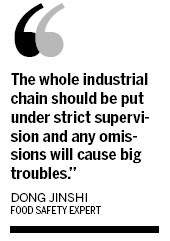 |
|
|
|
|||||||||||
The top quality watchdog reiterated its resolution on Friday to crack down on the illegal use of industrial gelatin in food processing.
"We will carry out a thorough and strict inspection of all producers of edible gelatin and food manufacturers that are using edible gelatin, and we will severely crack down on illegal activities," Fu Wenbiao, deputy director of the general office of the General Administration of Quality Supervision, Inspection and Quarantine, said at a news conference.
Fu's remarks came as the agency recently sent eight supervision teams to 17 provinces and regions to inspect the production and use of edible gelatin in order to ensure the safety of food eaten or sold during the coming three-day Labor Day holiday.
|
 |
Edible gelatin is a protein substance extracted from healthy animals' skin and bones. It is most often used as a gelling agent in the food and pharmaceutical industries, going into products such as jam and yogurt. Inedible gelatin, in contrast, is extracted from leather or even the skin and bones of sick animals and may be put toward industrial uses.
Dong Jinshi, a food safety expert, said edible gelatin must meet more than 20 standards pertaining to its content of heavy metals and other elements before it can be used in food, while inedible gelatin must only meet five standards before it can be used in other sorts of products.
Inedible gelatin can also brought up to the standards of the edible variety if it is first subjected to certain procedures, he said.
"So the priority in the inspections should be to look at providers of raw materials and then go down to gelatin producers and food manufacturers," Dong said. "The whole industrial chain should be put under strict supervision and any omissions will cause big troubles."
The public has been on its guard about buying food, especially types containing edible gelatin, ever since media outlets reported this month that drug capsules contaminated with chromium had been discovered.
The State Food and Drug Administration said on its website on Friday that 15 companies in Zhejiang, Henan, Sichuan and Chongqing were found to be producing the capsules.
The administration plans to order local drug authorities to supervise the recall and destruction of the tainted products.
The production licenses of companies engaged in illegal activities will be revoked, and people who are suspected of committing criminal offenses may be subject to legal charges, it said.
The administration has asked makers of drug capsules and pharmaceutical companies that produce capsule medicines to inform the public of the ingredients used in their products.
In a statement issued on Sunday, the Ministry of Public Security said inspections conducted over a week in Zhejiang, Hebei and Jiangxi provinces had led to 80 illegal production lines being shut down.
By Sunday, police had detained 45 people, arrested nine and seized more than 77 million capsules tainted with chromium.
Nine pharmaceutical companies have been accused of manufacturing drug capsules that contain inedible industrial gelatin. Moreover, 13 commonly prescribed drugs were found to be made at times with industrial gelatin, which contains a much greater amount of chromium than edible gelatin.
With stricter food standards in force, tainted capsules have been discarded in Xinzheng, Henan province, and Xi'an, Shaanxi province, media reported.
The State Food and Drug Administration said on its website on April 23 that local drug authorities should take strict measures to stop pharmaceutical companies from improperly discarding toxic capsules and to ensure that all such products are destroyed once they are detected.
Sun Zhongshi, an expert with the Ministry of Health's national rational drug use monitoring system, said the scandal is a sign that the drug watchdog should strengthen its supervision of the substances found both inside and outside capsules.
A group of lawyers have formed a team to take legal action against pharmaceutical companies that have misused industrial gelatin.
On April 23, they released a statement online saying they can help the victims in the scandal protect their rights.
Contact the writers at wangqian@chinadaily.com.cn and
chenxin1@chinadaily.com.cn